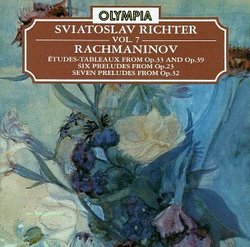| All Artists: Rchmaninoff, Richter Title: Rachmaninov: Études-Tableaux from Opp. 33 & 39; Preludes from Opp. 23 & 32 (Volume 7) Members Wishing: 1 Total Copies: 0 Label: Olympia Release Date: 7/7/1995 Genre: Classical Styles: Chamber Music, Historical Periods, Classical (c.1770-1830), Modern, 20th, & 21st Century Number of Discs: 1 SwapaCD Credits: 1 UPCs: 515524003371, 723721767020, 5015524403379 |
Search - Rchmaninoff, Richter :: Rachmaninov: Études-Tableaux from Opp. 33 & 39; Preludes from Opp. 23 & 32 (Volume 7)
 | Rchmaninoff, Richter Rachmaninov: Études-Tableaux from Opp. 33 & 39; Preludes from Opp. 23 & 32 (Volume 7) Genre: Classical
|
Larger Image |
CD DetailsSimilar CDs
|
CD ReviewsPerfection Alejandra Vernon | Long Beach, California | 06/30/2002 (5 out of 5 stars) "Richter gives these Etudes and Preludes a performance that is so impeccable, so luminous, that it fills me with astonishment every time I listen to it. It's as if he has made the music a living thing, one that inspires and fills the soul with beauty. With dazzling technique, the Ukranian master plays these difficult pieces with effortless fluidity. Anyone interested in Rachmaninov, Russian music, or piano music, should put this CD high on the "must have" list.Regarded as one of the finest Russian pianists of the 20th century, he had a wide range in his repertoire, from Bach to Bartok. He passed on in '97, and I'm sad to admit that I never heard him in concert...I'm sure it would have been a treasured experience. The simple booklet insert has short explanations of the music, and a mini-bio of Richter. The Preludes were recorded in '71, the Etudes in '83, and the sound is good. Total time for the CD is 74'30.There aren't too many words one can use to describe this CD. It's a supreme accomplishment from an artist gifted by the gods...one can fancy the world becoming a better place every time this is played...as Dostoevsky said, "beauty will save the world"." Richter at his finest Alejandra Vernon | 07/09/2000 (5 out of 5 stars) "If you're a Richter fan (and you should be, since he's the greatest Classical pianist of the 20th century), this CD simply has to be in your collection. It's definitely among the top 5 Richter CDs. The Etudes-Tableaux are so rarely heard, it's a joy to hear them played by the best. Richter has played these pieces on many different albums, but this one has the finest performances overall." Beyond words... John Grabowski | USA | 10/24/2000 (5 out of 5 stars) "This is as good as it gets. Richter is unequalled in these works. He never recorded the complete preludes, but those he did record and perform are so compelling that I cannot recommend any "complete" sets...I always defer to these, even though they do not represent all of the preludes. The Etudes-Tableaux are equally astounding. The other reviewers on this site are right when they say Richter had no peer here, except perhaps Rachmaninoff himself (who ironically recorded even fewer than Richter). Not Horowitz, not Weisenberg, certainly not Ashkenazy, can touch Richter in this music. This is a must-own for anyone who loves classical piano music, and heck, it's even great "candle-light dinner music" for a nice, moody, romantic evening for two! Or, if you saw the video "Richter the Enigma" and were blown away by some of the virtuoso piano playing, here is much of it on CD!"
|

 Track Listings (22) - Disc #1
Track Listings (22) - Disc #1